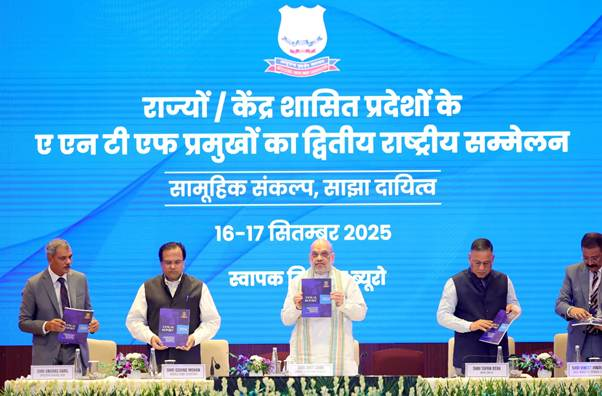Amit Shah Unveils NCB Report, Calls for Ruthless Fight Against Drug Cartels
Addressing the inaugural session, Shri Amit Shah said that Prime Minister Narendra Modi’s vision of a drug-free India is central to achieving the dream of a Viksit Bharat by 2047.

- Country:
- India
Union Home Minister and Minister of Cooperation Shri Amit Shah inaugurated the second National Conference of Heads of Anti-Narcotics Task Forces (ANTF) of States and Union Territories in New Delhi. The two-day conference (September 16–17) brought together ANTF chiefs from 36 States and UTs, senior officials of the Government of India, and key agencies including the Intelligence Bureau and the Narcotics Control Bureau (NCB). On this occasion, Shri Shah released the NCB Annual Report 2024 and launched the Online Drug Disposal Campaign.
Drugs and the Vision of Viksit Bharat 2047
Addressing the inaugural session, Shri Amit Shah said that Prime Minister Narendra Modi’s vision of a drug-free India is central to achieving the dream of a Viksit Bharat by 2047. “The youth are the foundation of any nation. If they are hollowed out by drugs, the country will lose its way,” he cautioned.
The Home Minister urged that the fight against drugs must not remain confined to the NCB or the Ministry of Home Affairs alone. Instead, it must become a national resolve involving every State government, ANTF, district police, and citizen groups.
Ruthless Action on Cartels: A Three-Tier Strategy
Shri Shah declared that the time had come to scale up action against drug networks, moving beyond small peddlers to dismantle three levels of cartels:
-
Those controlling entry points of narcotics into India.
-
Those handling interstate distribution.
-
Those engaged in local sale within states.
He urged each State to prepare a high-level strategy to strike at all three levels, backed by district police action plans.
Technology, he said, must be central to this effort — with tools like darknet analysis, cryptocurrency tracking, metadata analysis, financial flow mapping, machine learning models, and communication pattern studies.
Drug-Free India Campaign and Public Outreach
The Minister highlighted that the Drug-Free India campaign is active in 372 districts, engaging 10 crore citizens and 3 lakh educational institutions. Yet, he emphasized, this coverage is insufficient and must expand to every district and school.
-
Mission Drug-Free Campus is already underway across universities.
-
The Manas helpline (1933) is being promoted to provide assistance and awareness.
-
NCB has prepared a national drug network chart to help states understand and target traffickers.
He also urged involvement of religious leaders and youth organizations, recognizing their influence in spreading awareness and preventing drug abuse.
Institutional Mechanisms: NCORD and ANTF
Shri Shah pointed out that while district-level NCORD (National Narcotics Coordination Portal) meetings are increasing, 272 districts have yet to hold a single meeting. He called upon ANTF heads to press District Collectors and Chief Secretaries to organize these meetings regularly.
The Home Minister underscored the need for uniform structures, SOPs, and best practice exchanges to ensure operational consistency nationwide. He suggested using NATGRID in major cases to trace networks more effectively.
Extradition, Deportation, and International Cooperation
Highlighting the global dimension of narcotics trade, Shri Shah called for a robust extradition and deportation framework. He praised the CBI’s efforts in extraditing fugitives and urged close coordination between NCB, CBI, and State police to bring foreign-based traffickers under Indian law.
“A liberal and practical approach to deportation must be adopted. Just as we crack down on terrorism and gangs, drug cartels abroad must also face the arm of Indian law,” he said.
Synthetic Drugs, Labs, and Emerging Threats
Warning of the rising trend in synthetic drugs and clandestine labs, Shri Shah urged ANTFs to stay vigilant, destroy labs proactively, and prevent their re-establishment. Eliminating availability, he noted, will naturally push users towards treatment.
Record Achievements in Seizures and Disposal
The Home Minister revealed unprecedented results of recent operations:
-
1,37,917 kg of drugs worth ₹4,800 crore destroyed simultaneously at 11 locations.
-
Adoption of a scientific system for drug disposal every three months in states.
-
10,700 acres of drug crops destroyed in 2020, increasing to 31,761 acres in 2023.
-
Cannabis cultivation destroyed rose from 21,000 acres in 2020 to 34,000 acres in 2023.
Comparative figures showed a sharp increase in enforcement under the Modi government:
-
2004–2013: 2.6 million kg drugs seized, worth ₹40,000 crore.
-
2014–2025: 1 crore kg seized, worth ₹1.65 lakh crore.
-
2004–2013: ₹8,150 crore worth of drugs destroyed.
-
2014–2025: ₹71,600 crore worth of drugs destroyed.
-
Arrests rose from 1.73 lakh (2004–2013) to 7.61 lakh (2014–2025).
“These numbers prove that coordinated efforts yield results. But given the scale of the problem, our efforts must multiply many times over,” Shri Shah said.
Call to States: Special Squads and Forensic Capacity
Shri Shah directed States to form special squads dedicated to following the financial trail, hawala networks, and cryptocurrency transactions, supported by cyber checks. He stressed that every State must have a narcotics-focused forensic lab to ensure strong prosecutions and prevent offenders from easily securing bail.
He urged strict use of the PITNDPS Act wherever applicable, and proposed a quarterly review of anti-narcotics action checklists to ensure district police accountability.
A Three-Pronged National Strategy
Concluding his address, Shri Amit Shah outlined a three-pronged national approach:
-
Ruthless disruption of supply chains.
-
Strategic demand reduction through awareness and prevention.
-
Humane harm reduction to support rehabilitation and treatment.
“Our aim is not to create statistics, but to build an India where such statistics are unnecessary,” the Home Minister said, reaffirming the government’s determination to leave no stone unturned in achieving a drug-free India.










